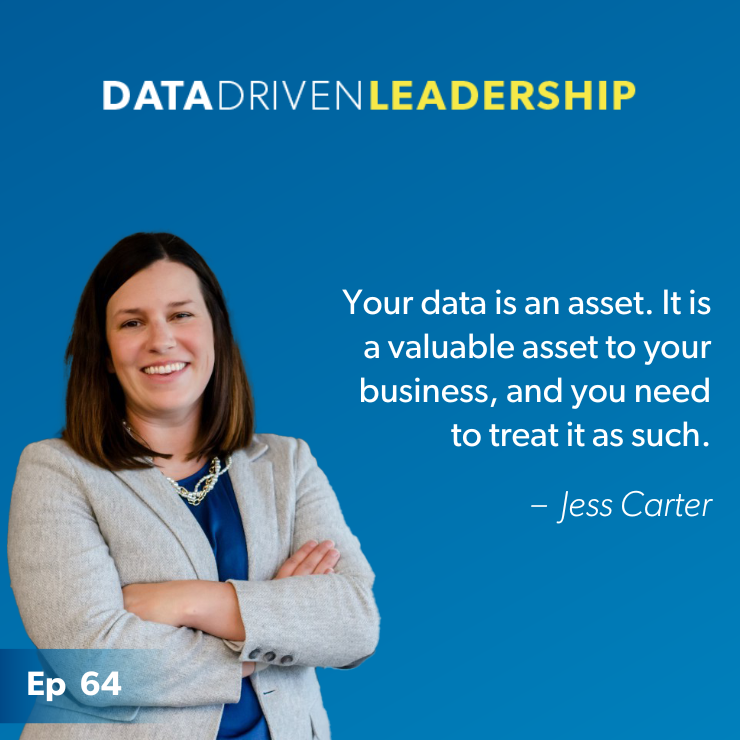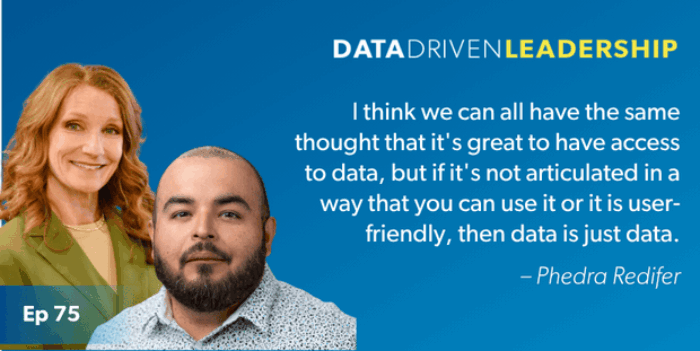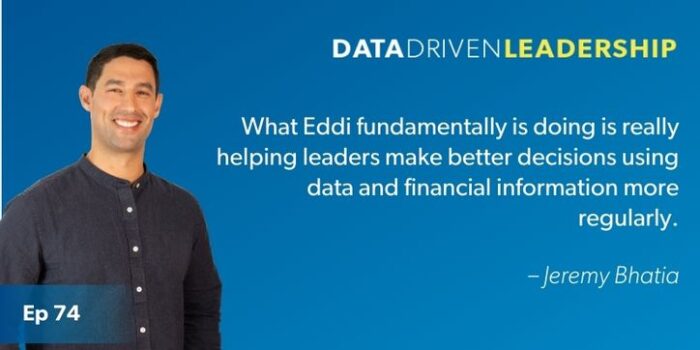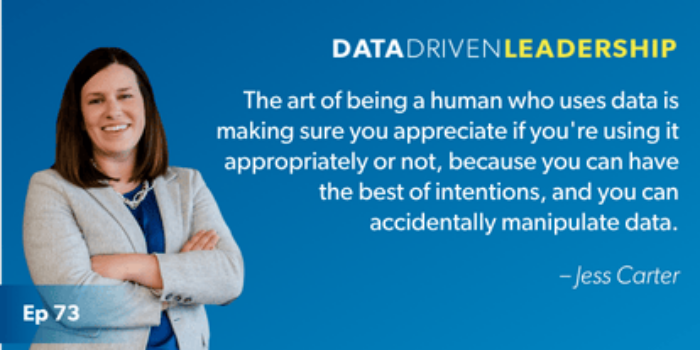
Building a Data-Driven Culture: Lessons from Bumble, Southwest Airlines and More
Transcript
Show ID [00:00:04]:
The power of data is undeniable. And unharnessed, it's nothing but chaos.
The amount of data was crazy.
Can I trust it?
You will waste money. Held together with duct tape. Doomed to failure.
This season, we're solving problems in real-time to reveal the art of the possible.
Making data your ally, using it to lead with confidence and clarity, helping communities and people thrive.
This is Data-Driven Leadership, a show by Resultant.
Jess Carter [00:00:33]:
Hey guys, welcome back to Data-Driven Leadership. I'm your host, Jess Carter. Lately we have had some really exciting guests on the podcast and I wanted to take a little bit of time to revisit pulling those conversations together and highlighting their takeaways in a way that just might be a touch different and more helpful for our listeners. We'll be discussing how these big brands are tackling and solving their data challenges, and we'll be sharing what I learned from each episode.
My goal is to summarize these conversations in a way that's helpful for you, so each of you can apply something important to your own work. One of the things I'm really committed to this year in 2025 is doing everything I can to make sure that I'm not part of the noise around, you know, everything that people are pushing out there in LinkedIn and in podcasts. I want these episodes to be functionally valuable and pragmatic for you all, and so that's part of the commitment for this episode. I'll also be taking aspects of these discussions and applying them to other industries, showing how strategies shared by our guests can really make an impact outside of their specific fields and, hopefully, into yours.
Jess Carter [00:01:38]:
We'll be digging into episodes with Bumble, Stanley Black & Decker, Southwest Airlines and Walker Information to explore the approaches and insights to make a difference for businesses of all sizes. Let's get into it.
First of all, there was this really interesting accidental sort of chronology to these episodes and guests, and so I'm going to leverage that here as if it was intentional. But first and foremost, when we talked to Bumble's director of analytics, Lina Mikolajczyk, she talked through how to set up a data team. How do you find its value proposition? How do you get buy-in from the organization? She laid out this really practical 90-day plan about how she surveyed the company to understand the team's current impact and potential impact and how people were already thinking about wishing they could use that team in a more effective way. She helped associate the cost of the team, like how much does it cost for the team to put together a dashboard to the value of that dashboard and the output that it provides. And then she really gave the data team a purpose in the company and made sure that she connected their work to the outcomes that the business was really intending so they felt really committed to the vision of the company.
Jess Carter [00:02:48]:
I think if you're a data leader, she more or less gave you a playbook on your first 90 days. And if you're not a data leader, I think you could also listen to that episode reflecting on how could you be a good partner to your data leader in your organization and also leverage them. I think a lot of people in industries are still trying to figure out what to do with data. And if you can be one of the first people to buy in and help your data leader with a value proposition, you're probably going to get some really cool dashboards and attention and it's kind of a win-win. So I really like the way she set that up. And I think if you're, if you're not a data leader but you're around one, there's ways for you to make sure that you're leveraging them in effective ways and you're getting value proposition while you help set them up for their role in the company.
Next we talked to Walker Information. Jack Walker, the senior vice president, on how to listen in order to evolve the highest and best use of your data assets in an organization.
Jess Carter [00:03:46]:
I am in love with a great story and the idea that they were leveraging data 85 years ago by surveying people in a grocery store. It's like innovation at its finest. And I think it's so exciting to hear anyone who can tell a story that's 85 years old about how they maintained this fundamental feedback mechanism, this CX feedback, listening to customers, and really have helped create industry standards around that as, you know, so many things have changed. There were so many takeaways. I mean, I think at a really, at a high level, I think that the Walker Information, I think talking to Jack opened up my eyes about just how important it is to make sure that your organization has a listening infrastructure. That you get feedback from customers, whether it's people on the podcast commenting and reviewing our podcast and telling us what they want to hear more about or what they want to hear less about. You know, a professional services company that sends surveys to check in with clients, focus groups that you do, product feedback and reviews that you have. I think they really took it on the chin to say, hey, we don't think this is supposed to be anonymous.
Jess Carter [00:05:00]:
We think that there's a relationship between consumers and product companies or professional services. And we think that there's room for us to figure out B2B, B2C. How do we make sure that there is an infrastructure in place for us to listen to what the market wants from our company and continue to evolve towards the things that they want and need?
I think from a detail perspective, you can't leverage those voices if they're not democratized across an organization. So I think making sure people have access to that customer data is really, really important. I think listening is also something that builds a lot of trust and loyalty. So just having this kind of a program, he kind of emphasized, is a step to customers feeling heard. Now, you can also ruin that by not acknowledging their feedback or doing anything with it, but by having an avenue to receive that feedback and have to respond to it in some way is a step in the right direction and can be really scary.
I also think the real reflection after that first step in receiving that feedback is figuring out how do you make it actionable? What are we going to receive? What are we going to change about our business model, our services, our product offerings to respond to the market's asks? And how do you vet those asks? How do you know if it's just Jess who wants one little thing in a feature and a product that I use versus 90% of your customer base is waiting for that feature to come out, but no one's asking.
Jess Carter [00:06:21]:
So I think that there's a lot there for organizations to start to explore, reflect on, and figure out how do you decide what to action on based on the data that you're receiving? And then he talked a little bit about how engagement equates to value. You know, I rolled out a program and I was very honest about this. In that episode, we used Walker at Resultant. I was the lead on that, that initiative to roll out this listening infrastructure. And for me personally, I was kind of afraid of what would happen when we got this feedback and what if somebody was unhappy. And Walker really helped coach me and our organization through realizing that engagement of any kind means that someone is invested in our success. Somebody wants us to succeed or they wouldn’t be spending the time giving us the feedback.
And so I think that that's really powerful too, for organizations. So Walker, to me, in my own opinion, this is just Jess here postulating.
Jess Carter [00:07:16]:
But I think people, either that's ingrained in you or it's not. It's a little bit black and white. And I think Walker made it more accessible. In that episode, Jack really walked us through how fundamentally they're just creating a foundational framework for companies to continue listening regardless of what the company's shape looks like, its services, its offerings, its products.
Then we talked to a product company, Stanley Black & Decker, that's in like, I don't know, a bazillion countries and it's so big and that is daunting to me. I have not worked in a international company before and Jason Winterbottom, director of data product, really helped us appreciate how a company of that size or smaller can leverage data to start to treat it like a product. So I am used to this concept, but I think it's probably fairly unfamiliar to a lot of listeners. And you know, it's been happening in the last 10 to 15 years where people start to realize your data is an asset.
Jess Carter [00:08:19]:
It absolutely is an asset to your business. It can be valued as part of a business's transaction. It is, it is a valuable asset to your business and you need to treat it as such. You know, there's a lot of people who go ask for datasets and that's fine, but a dataset to me implies a one-time use. Stanley Black & Decker and Jason have really taken on this larger approach that has data governance and a whole bunch of things in it to really bundle these data products where they have, you know, they're investing in the updated refreshed data and what's changing about that data. And he talked about SKU matching and being able to compare their SKUs of relative products to competitors in the market and their relative products. Are the prices going up or down and is there a range in that in your pricing controls and do you see when that's moving outside of a range? And so I got really excited about—not that everyone works at Stanley Black & Decker or even a product company—but if you think about how much leaders like yourself need access to data, it would just seem a little silly to me to imagine that all data at any company needs a one-time extract and analysis or dashboard and then we throw it out until we need the next one. There is constant datasets that you—there are—that you control and manage.
Jess Carter [00:09:37]:
And I think appreciating what is the data that I rely on so consistently. Is it your P and L? Is it pipeline information? The average size of a deal or the number of deals in your pipeline? Is it your delivery, is it your product sales or people opting in or out of using your product, downloads, whatever your metrics are? I think that there's an argument for any business to contemplate, do we have a good sense of what our data products are? And what I mean by that, again is, are we investing in these datasets that do get refreshed in a timely manner for the business to make the best decisions we can based off of the most critical data in our organization?
So, I think he talked a ton about really practical things about treating data like a product, organizing data for usability, which is not the sexiest thing in the world. Data governance, data organization of data. These are necessary things to get done, but no one has mastered that. And if you are in the throes of organizing your data for usability or productizing your data, I would just say, like, may the force be with you, because it is always probably, in my opinion, going to feel a little bit like a train wreck. It's never going to be perfect. It does require humans who care about data cleansing to whatever extent. It is an important job.
Jess Carter [00:10:56]:
And it's really easy to not want to get into it and roll up your sleeves or to get so far in the weeds that you miss the big picture. So just, you know, peace be with you if you're on that journey. I think he also then did talk about that outcome though, is like there is this light at the end of the tunnel. And I really appreciated this episode because this is where I think Jason got really passionate, where he talked about building reports and dashboards for decision makers. Like, once you've been along that journey, people get to start asking different, much more interesting questions about the business. And I think businesses get tougher, more resilient because they can ask more effective questions and listen to see what their data is telling them about the business and make decisions that are naturally, innately data driven and that are going to help them with a business that sustains whatever forces are coming upon it.
Lastly, Southwest Airlines. So we talked to France Grenot, the managing director of IT data foundation business delivery. And I think that there were so many good points that France made.
Jess Carter [00:12:02]:
What stuck with me throughout this episode is Southwest Airlines’ commitment to the customer. This again, sort of back to Walker. This, you know, multi-decade exercise of we've listened to the data, we've listened to our customers, they've changed their minds and we're going to change our business model with them. And we can do that in a fairly timely fashion because of the data. We can see leading indicators and requests for changes in how, how the airline industry works. And I also really loved, she had this whole commercial on how much Southwest Airlines didn't leverage, like they weren't just trying to beat the other airlines. They wanted to compete in the hospitality space when it comes to, hey, when you fly, do you feel like there is a hospitality? There's a greeting of you in the middle of a busy, fairly stressful environment.
Jess Carter [00:12:57]:
And I really enjoyed this idea of innovation at a level where that industry was huge and it was far-reaching and it was kind of chaotic and known for not being the most peaceful thing. That's quite the endeavor for Southwest to say, let's go talk to some of the best hotels that are cornering the market on hospitality and steal and borrow some of their approaches to things and apply them to our business. How neat would it be if all of the data leaders, you know that are on their data journey stopped and looked at their business and thought, okay, big picture. I know that there's a lot of things going right in our company, but what would help us level up? Like, what would be a different industry that if we reflected and modeled X behavior from some other industry, how much more effective would we be and could we actually start to change the tides and the culture in our own industry? What a powerful thought process.
For me, it was just really interesting to hear her passion and also just to reflect on how thoroughly Southwest Airlines, their culture, permeates everything that is accomplished or pursued in their business strategy. There were so many things about that episode that I thought were really incredible and they really did lay the groundwork for France to come in and say, this is the easiest place to come in and make a dent in data. Because everybody cares so deeply, innately about how we treat the customer, how we treat each other, that that data became extremely valuable and people wanted to eat it up.
And so part of our journey as data-driven leaders, we can put data out there, but if no one's willing to consume it or do anything with it, what is the phrase? Are we a tree that fell in the forest and nobody heard it? As we look to how we further our own data-driven leadership as data-driven leaders, who do we want to make sure we're collaborating with? What parts of the businesses that we're in, the nonprofits, the boards of directors that we participate in to try to make a world, the world, a better place? Where do we need to walk a little bit further on a bridge to meet those leaders where they and help them see the potential of what data can do for them? I think that we might just all take advantage of that reflection and think about maybe we write down two or three names of business leaders, again, nonprofit industry leaders that we think that we need to walk a little bit further across that bridge and meet them where they're at and help them get across to our side to leveraging data in more meaningful ways. So I'm going to leave you with that.
Jess Carter [00:15:24]:
I really hope that you guys have enjoyed the last few episodes. It has been nothing short of truly a privilege. I sort of have to pinch myself every day that we get to keep doing this and putting these conversations out there and I truly hope that we are making the world a better place through your data-driven leadership.
So thank you for listening. I'm your host Jess Carter. Please as I just talked about in the episode, don't forget to follow Data-Driven Leadership wherever you get your podcasts and rate and review letting us know how these data topics are transforming your business. You are not going to scare us if you have critiques or opportunities for improvement. We can't wait for you to join us on the next episode, guys.
Insights delivered to your inbox





